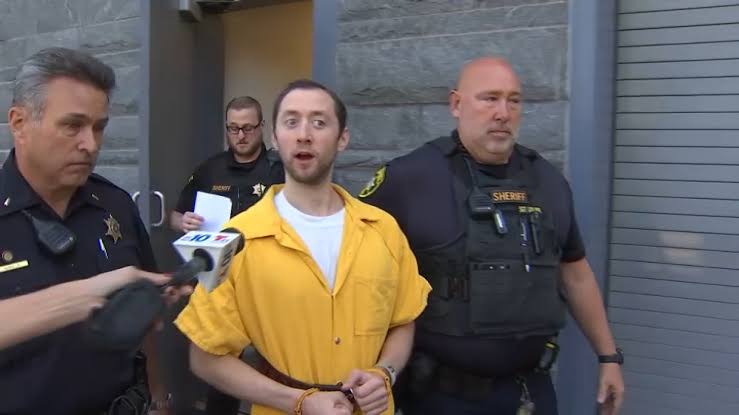A Pennsylvania man on trial for the fatal shooting and beheading of his father, an act he later posted to YouTube, testified in court on Wednesday, July 9, that the killing was a backup plan after an attempt to arrest his father failed.
Justin D. Mohn, 33, took the stand in a Bucks County courtroom on the third day of his trial, where he faces charges including murder in connection with the January 30, 2024, death of his father, Michael F. Mohn.
Testifying in a calm, emotionless manner with his hands shackled to his waist, Mohn spoke for more than two hours during direct and cross-examination. He claimed the incident was sparked by a disagreement over political views and what he described as false statements made by his father in a federal civil case.
According to Mohn, he confronted his father in the bathroom of their family home in Levittown and informed him of his intent to perform a citizen’s arrest for what he labeled as treason. He testified that his father, whom he said was trained in martial arts, resisted and reached for the firearm, prompting Mohn to shoot him.
“Unfortunately, he resisted,” Mohn told the court. “I was hoping to perform a citizen’s arrest on my father for, ultimately, treason.”
Mohn referred to a list found in his notebook during the trial that included the words “Boom” and “Slice,” which he described as his “Plan B” if the arrest failed. He said he believed his father would comply, and that the violence was not driven by hatred but by his desire to make a political statement.
When asked why he beheaded his father, Mohn stated he intended to send a message to federal employees to meet a list of demands, including mass resignations and the cancellation of public debt. He also claimed the shocking act was designed to draw attention and lessen violence by prompting public discourse.
His mother, Denice Mohn, wept in court as her son described the killing and the motives behind it.
“I knew something such as a severed head would not only go viral but could lessen the violence,” he said.
Prosecutors: A Cold, Calculated Act to Terrorize
Prosecutors alleged that Mohn used a recently purchased handgun to kill his father and then decapitated him using a kitchen knife and a machete. A 14-minute video of the act was uploaded to YouTube and remained online for several hours before it was taken down.
Later that day, Mohn was arrested after climbing a fence at Fort Indiantown Gap, the Pennsylvania National Guard’s headquarters. At the time of his arrest, he was found with a USB device containing images of federal buildings and what authorities described as instructions for making explosives.
He has a documented history of posting anti-government rhetoric online, which authorities say dates back several years.
During earlier proceedings, his mother testified that police had visited their home to warn Mohn about his increasingly radical online behavior. She also said she and her husband were financially supporting their son as he searched for employment.
Prosecutors described the murder as something straight out of a horror film and argued that it was a premeditated act intended to terrorize government workers. They characterized Mohn’s actions as cold, calculated, and organized.
Michael F. Mohn, the victim, was a longtime engineer with the U.S. Army Corps of Engineers in the Philadelphia District. He was remembered in court as a devoted father and respected neighbor.
In the video posted to YouTube, Justin Mohn referred to his father as a traitor and identified him as a federal employee of 20 years.
During a previous competency hearing, a defense expert testified that Mohn had written to Russia’s ambassador to the United States seeking asylum and had even apologized to President Vladimir Putin for falsely claiming to be the czar of Russia. Despite this, the judge ruled Mohn competent to stand trial.
The trial has included graphic evidence, including still photos and video footage. The judge issued a warning to courtroom observers about the disturbing content and offered the option to leave before the materials were presented.













